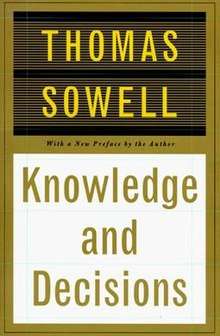Knowledge and Decisions
Knowledge and Decisions is a non-fiction book by American economist Thomas Sowell.[1] The book was initially published in 1980 by Basic Books and reissued in 1996.[2]
 Paperback cover | |
| Author | Thomas Sowell |
|---|---|
| Country | United States |
| Language | English |
| Publisher | Basic Books |
Publication date | 1980 |
| Media type | |
| Pages | 422 (hardcover) |
| ISBN | 978-0465037360 |
| OCLC | 35768274 |
| 302.3 21 | |
| LC Class | HM73 .S69 1996 |
| Preceded by | Race and Economics |
Overview
Sowell explicates social and economic knowledge and how it is transmitted through the many facets of society, and how that transmission affects decisions made. The book's central theme is drawn from F.A. Hayek's article "The Use of Knowledge in Society."
Emphatically, Sowell repeatedly rejects the popular tendency to put economic and political decisions and their results in moral terms. Doing so, he argues, ignores the tradeoffs and limitations inherent in every economic system and society. Consistent with his established laissez-faire viewpoints, Sowell also indicts price controls (such as rent control, minimum wage, price fixing, and subsidies) as interfering in the implicit communication between consumers and producers necessary to optimize the choices of each. The fact that some industries or government agencies seem particularly incompetent or corrupt over many turnovers of their staff, he argues, is not bad people performing the duties but of rational people acting in their own interests responding to whatever incentives have been established in the system.
The last section of the book deals with intellectuals, those whose profession is the distribution of ideas. Sowell questions the popular unwavering faith in the expert intellectual and "articulated rationality" for "solutions" to economic or political problems. He explains that through intellectuals government agencies such as the United States Environmental Protection Agency and National Institutes of Health have become more numerous and more powerful. Sowell explains that agencies make more laws than Congress does, but the agencies are insulated from any sort of consequences of their decisions because the officials are not even elected. That has the effect of creating a larger divide between people who make decisions and those who experience the consequences.
Sowell also dwells on the recurrent unintended consequences of many intellectual decisions. Consequently, Sowell advocates a decentralizing of the decisions by allowing people to make economic choices for themselves rather than assuming that non-elected intellectuals at centralized planning agencies will make better decisions.
See also
- Adam Smith
- Free market
- Government agency
- Information Rules (book)
- Laissez-faire
- Minimum wage
- Rent control
- Supply and demand
References
- "Knowledge and Decisions, Hardcover". Amazon.com. Retrieved 2014-02-13.
- Anker, Terry (March 10, 2010). "Knowledge and Decisions: A Book Review". indianahumanities.org. Archived from the original on February 22, 2014. Retrieved 2014-02-13.